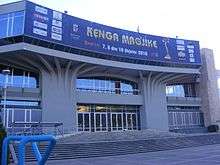Kënga Magjike
| Kënga Magjike | |
|---|---|
 Logo of the festival | |
| Genre | Pop music, folk music, classical music |
| Dates | November |
| Location(s) | Albania (Kosovo in 2004) |
| Years active | 1999–present |
| Founded by | Ardit Gjebrea |
| Website | Official Kënga Magjike |


Kënga Magjike (Magical Song in English) is a major musical event in Albania. Throughout its history, different broadcasters have been credited with the production and airing of this event, including RTSH, Klan TV, TVA, RTV NRG (Albania) and RTV21, RTK (Kosovo), as well as many radio stations. It is currently produced and aired by Klan TV.
Kënga Magjike was created by singer, composer, host and organizer Ardit Gjebrea and began airing in 1999. It usually airs each November, with a few exceptions. It was originally aired as a three or four night event similar to Festivali i Këngës; however, in 2005 a new format of presenting the songs was introduced. Each song was broadcast one month prior to the semi-finals and the final in a special edition called "Duke Pritur Kënga Magjike..." (Awaiting Kënga Magjike...), giving the viewers a chance to vote for the songs that would pass on to the semi-finals through phone, text or online in the festival's official website. A jury was also used when determining which songs made it to the next stage.
This format was later replaced by the current system, where groups of songs are presented weekly in the E Diela Shqiptare (The Albanian Sunday) show on Klan TV hosted by Ardit Gjebrea. Established singers automatically pass to the semi-finals stage, while newcomers must rely on the verdict of a professional jury. Once the semi-finalists are determined and their acts are performed in the semis, it is the singers themselves who must vote for each other in a 1-through-30 (skipping 23, 25, 27, 28 and 29) point system to determine both the songs that will reach the finals and their final ranking. The professional jury, the organizers of the festival and the TV station are tasked with determining the titles of the prizes that each finalist will be awarded.
Following criticism for the use of playback in the delivery of songs, the organizers decided to limit the use of playback to just the weekly presentation stage in 2015. Established singers are allowed to use playback in this phase, while newcomers must sing live in order to receive a verdict by the jury. Nonetheless, the semi-finals and the final must all be delivered live by both established and debuting singers.
The festival has been praised for the diversity of music it has brought to the public, providing a great mixture of singers and bands from Albania with those from neighboring countries, a large portion coming from Kosovo, Macedonia, Montenegro and other areas. Kënga Magjike has also been the stage for many comebacks of famous Albanian singers that reside in other countries, as well as artists which have contributed to the Albanian music industry in the past. Songs from this contest have resulted in numerous memorable hits for Albanians throughout the world. Compared to its main competitors, Kënga Magjike features more bubble-gum and commercialized music, contrasting with the predominantly alternative and rock genres featured in Top Awards on Top Channel, while not being as exclusively prohibitive as Festivali i Këngës, which typically admits only professional vocalists.
The main host of Kënga Magjike has always been Ardit Gjebrea. Sometimes he has hosted the show alone, while in other occasions there have been other co-hosts, such as Natalia Estrada (2001 and 2002) and Brigitte Nielsen (2003).
Hosts
| Year | Host(s) | Venue | Director |
|---|---|---|---|
| 1999 | Ardit Gjebrea | Pali Kuke | |
| 2000 | Ardit Gjebrea | ||
| 2001 | Ardit Gjebrea & Natalia Estrada | ||
| 2002 | Ardit Gjebrea & Natalia Estrada | Vera Grabocka | |
| 2003 | Ardit Gjebrea & Brigitte Nielsen | ||
| 2004 | Ardit Gjebrea | ||
| 2005 | Ardit Gjebrea & Denada Dajlani | Agron Vulaj & Astrit Idrizi | |
| 2006 | Ardit Gjebrea | ||
| 2007 | Ardit Gjebrea | ||
| 2008 | Ardit Gjebrea, Artemisa Ozaj & Anis Brahimi | ||
| 2009 | Ardit Gjebrea | ||
| 2010 | Ardit Gjebrea | ||
| 2011 | Ardit Gjebrea & Songül Öden | ||
| 2012 | Ardit Gjebrea, Olta Gixhari & Armina Mevlani | Pali Kuke & Gaetano Castelli | |
| 2013 | Ardit Gjebrea | ||
| 2014 | Ardit Gjebrea & MAD TV presenters | ||
| 2015 | Ardit Gjebrea & Almeda Abazi | ||
| 2016 | Ardit Gjebrea & Crown Princess Elia of Albania | ||
| 2017 | Ardit Gjebrea , Bes Kallaku , Erion Isai , Arjola Shehu & Nevina Shtylla | Aldon Lipe |
Winners
| Year | Artist | Song | Translation | Authors |
|---|---|---|---|---|
| 1999 | Elsa Lila | "Vetëm një fjalë" | Only one word | Alfred Kaçinari (m), Jorgo Papingji (l) |
| 2000 | Irma Libohova & Eranda Libohova | "Një mijë ëndrra" | One thousand dreams | Kristi (m), Irma Libohova (l) |
| 2001 | Rovena Dilo & Pirro Çako | "Për një çast më ndali zemra" | My heart stopped for a second | Pirro Çako (m) & Timo Flloko (l) |
| 2002 | Mira Konçi | "E pathëna fjalë" | The unspoken word | Shpëtim Saraçi (m), Pandi Laço (l) |
| 2003 | Ema Bytyçi | "Ku je ti" | Where are you | Adrian Hila (m&l) |
| 2004 | Irma Libohova | "Prapë tek ti do të vij" | I'll return to you | Irma Libohova (m) Floran Kondi (l) |
| 2005 | Genta Ismajli | "Nuk dua tjetër" | I don't want anyone else | Adrian Hila (m&l) |
| 2006 | Armend Rexhepagiqi | "Kur dashuria vdes" | When love dies | Armend Rexhepagiqi (m) & Aida Baraku (l) |
| 2007 | Aurela Gaçe | "Hape veten" | Open yourself | Flori Mumajesi (m) & Timo Flloko (l) |
| 2008 | Jonida Maliqi | "Njëri nga ata" | One of them | Kaliopi (m) & Aida Baraku (l) |
| 2009 | Eliza Hoxha & Rosela Gjylbegu | "Rruga e zemrës" | Heart's path | Darko Dimitrov (m) & Eliza Hoxha (l) |
| 2010 | Juliana Pasha & Luiz Ejlli | "Sa e shite zemren?" | How much did you sell your heart? | Pirro Çako (m&l) |
| 2011 | Redon Makashi | "Më lër të Fle" | Let me sleep | Redon Makashi (m&l) |
| 2012 | Alban Skenderaj | "Rrefuzoj" | I refuse | Alban Skenderaj (m&l) |
| 2013 | Besa | "Tatuazh në zemër" | Tattooed heart | Darko Dimitrov (m) & Alban Skenderaj (l) |
| 2014 | Aurela Gaçe & Young Zerka | "Pa Kontroll" | No control | Adrian Hila (m&l) |
| 2015 | Aurela Gaçe | "Akoma jo" | Not yet | Adrian Hila (m&l) |
| 2016 | Rozana Radi | "Ma thuaj ti" | You tell me | Elgit Doda (m) & Rozana Radi (l) |
| 2017 | Anxhela Peristeri | "E cmendur" | Crazy | Kledi Bahiti (m) & Olti Curri (l) |
Notes
In 2003, the jury was made up only of females, a first in the history of Albanian festivals.
In 2004, the contest was held in Kosovo for the first time. It is referred to as the 2004 edition, even though it happened in January 2005.
In 2009, the voting results revealed that the 1st place and the 2nd place have a difference of only 5 points. In the previous years the difference between the 1st and 2nd place was usually 60 points or more
Since 2010, the voting was direct-voting, so the participants showed their votes openly.
In 2015, the voting results revealed that the 2nd place and the 3rd place had a difference of only 1 point.